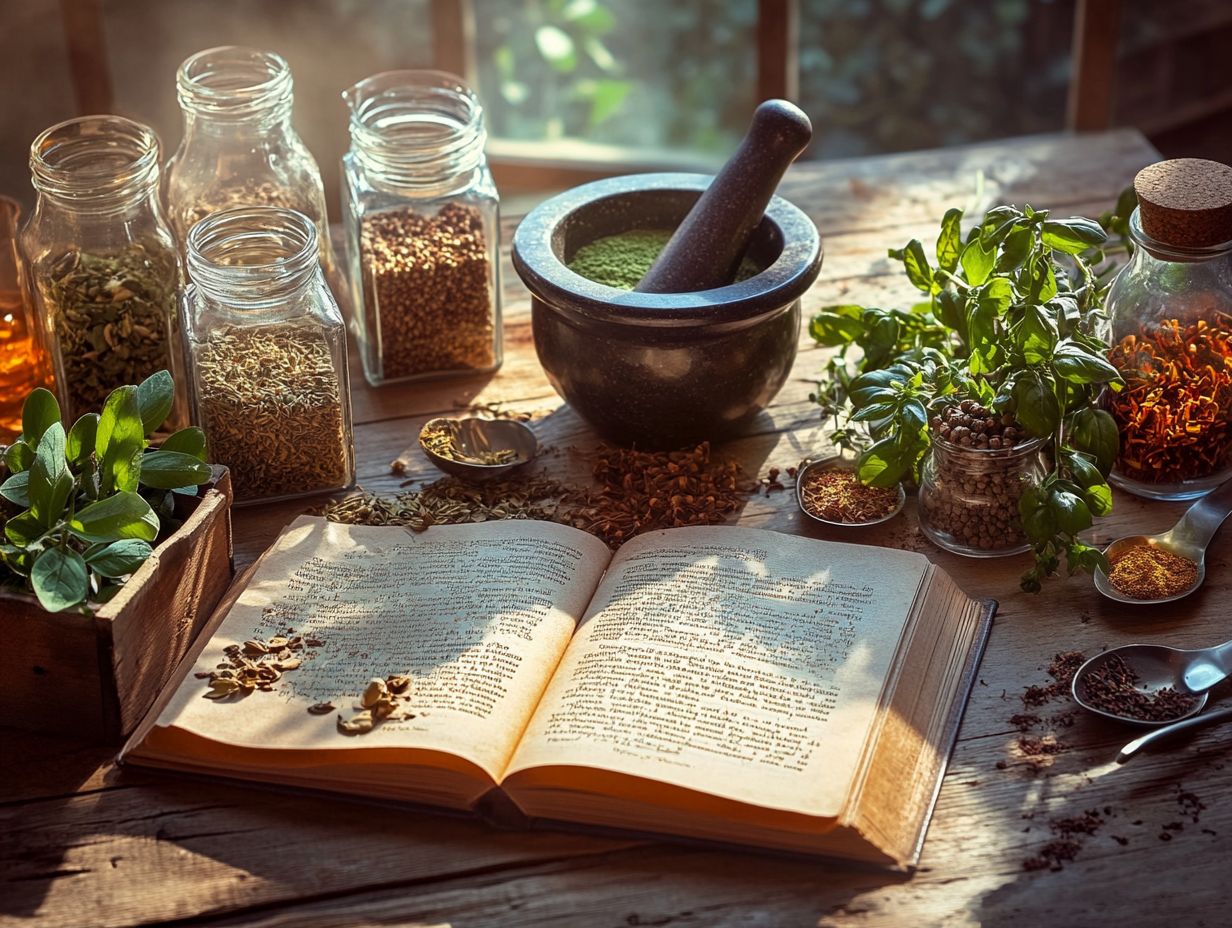How to Use Herbal Remedies in Holistic Nutrition?
Herbal remedies have enjoyed a long-standing reputation for their remarkable healing properties and their ability to enhance overall well-being. In today s world, which increasingly values natural health solutions, these remedies provide a distinctive avenue for supporting your wellness.
From soothing teas to powerful supplements, herbal options can beautifully complement your dietary choices. This article explores different types of herbal remedies, offers guidance on how to select and prepare them safely, and shares tips for integrating them into your meals.
Whether you are a seasoned herbalist or just beginning your journey, you ll find valuable insights here to enrich your nutrition naturally.
Contents
- Key Takeaways:
- The Role of Herbal Remedies in Overall Health
- Types of Herbal Remedies
- Selecting and Preparing Herbal Remedies
- Safety and Side Effects of Herbal Remedies
- Integrating Herbal Remedies into Your Diet
- Frequently Asked Questions
- What are herbal remedies and how can they be used in holistic nutrition?
- Are herbal remedies safe for everyone?
- How do I know which herbal remedies to use for my specific health needs?
- Are there any potential side effects from using herbal remedies in holistic nutrition?
- How should I incorporate herbal remedies into my holistic nutrition plan?
- Are there any precautions I should take when using herbal remedies in holistic nutrition?
Key Takeaways:

Discover the Power of Herbal Remedies!
Herbal remedies, derived from a rich variety of medicinal plants, have been embraced across cultures for centuries. They often fall under the categories of herbal medicine, folk medicine, and dietary supplements.
These natural supplements come in many forms think teas, tinctures, and extracts all designed to promote holistic health by leveraging the therapeutic properties of plants like ginseng, turmeric, and elderberry.
Throughout history, herbal remedies have played a key role in diverse healing traditions, serving as treatments for ailments and preventive measures for overall wellness. Ancient civilizations, such as the Egyptians and Chinese, meticulously documented the extensive uses of plant-based therapies, acknowledging the remarkable natural compounds they possessed.
Today, in wellness coaching, you ll find these herbal products increasingly woven into personalized health plans aimed at supporting both physical and mental well-being. The integration of herbal medicine into modern healthcare is gaining momentum, as more practitioners recognize the value of these time-honored practices alongside contemporary medical approaches.
The Role of Herbal Remedies in Overall Health
Herbal remedies play a vital role in boosting your health naturally, emphasizing the importance of treating the body as an integrated whole. This approach recognizes the intricate connections between physical, mental, and emotional well-being.
By incorporating herbal supplements into your daily diet, you can elevate your energy levels, alleviate anxiety symptoms, and support your immune system. This thoughtful integration promotes a harmonious and balanced lifestyle.
How Herbal Remedies Boost Your Health
Herbal remedies offer a valuable complement to an overall health approach, providing natural solutions for stress relief, anxiety management, and overall wellness. These herbal products can effectively address various health concerns while reducing reliance on synthetic medications.
Incorporating herbs like chamomile, lavender, and ashwagandha into your daily routine can significantly promote emotional balance and resilience. These natural alternatives encourage relaxation and empower your body to handle stressors more adaptively.
It s crucial to prioritize your safety by consulting with healthcare professionals before starting any new herbal regimen. Some herbs may interact with conventional medications, so this thoughtful consideration will help you enjoy the benefits of herbal remedies while safeguarding your health.
Are you ready to explore the world of herbal remedies? Dive in and share your journey with us!
Types of Herbal Remedies

Discover the fascinating world of herbal remedies! They come in various forms, each with unique benefits that can enhance your health.
You can choose from herbal supplements, extracts, teas, or whole medicinal plants, giving you the flexibility to select the most suitable option for your specific health needs.
Whether you’re looking to boost your energy levels, alleviate cold symptoms, or find relief from anxiety, there s an herbal solution tailored for you.
Herbs, Teas, Supplements, and More
You ll find a variety of herbal remedies at your disposal. Think herbs, teas, and supplements, all designed to offer health benefits.
Options like ginseng can provide an energy boost, while chamomile works wonders for relaxation. Elderberry is your go-to for immune support.
Each of these herbal extracts comes with its own advantages, allowing you to tailor your choices to meet your specific health goals.
Research shows that some herbs are effective for specific health concerns. For example, St. John’s Wort has been shown to alleviate symptoms of mild to moderate depression, positioning it as a strong contender in the realm of natural mental health support.
Chamomile, often savored as a soothing tea before bedtime, is well-regarded for its calming effects that can significantly ease anxiety levels.
By incorporating these herbs into your daily routine, you can elevate your well-being. Whether you re brewing a comforting cup of chamomile tea or opting for a St. John’s Wort supplement, the possibilities are both versatile and perfectly tailored to your personal preferences.
Selecting and Preparing Herbal Remedies
When selecting and preparing herbal remedies, you must carefully consider the quality, dosage, and your unique health conditions, along with any possible reactions with other supplements.
It s crucial to ensure that the herbal products you choose have undergone thorough quality testing and are free from contamination, as this is vital for both safety and efficacy.
Consulting a healthcare provider can offer valuable guidance on their proper use, helping you navigate the intricate world of herbal medicine with confidence.
Tips for Choosing and Using the Best Herbs
When selecting herbs for personal use, it s essential to consider various factors, including your individual health goals and potential side effects.
Understanding the unique properties of each plant helps you determine effective herbal dosing and usage.
Exploring herbalist training can further enhance your ability to choose the best herbs to support your wellness journey.
By understanding the specific benefits and possible interactions of different herbs, you can make informed decisions that cater to your unique needs.
Prioritizing consumer safety is crucial; this means ensuring the quality and sourcing of your herbal products. Certified herbalists possess the expertise to help you navigate these considerations.
Such training not only deepens your knowledge but also encourages a responsible approach to herbal usage. This ensures you are well-equipped to reap the full benefits while minimizing any potential risks.
Safety and Side Effects of Herbal Remedies

Understanding the safety and potential side effects of herbal remedies is crucial for your health management. Some herbs may lead to adverse effects or interact negatively with other medications.
By being aware of issues like kava’s association with liver damage or the sedative qualities of valerian root, you can make informed decisions about your use of herbal supplements.
This knowledge gives you the power to navigate your wellness journey with confidence and care.
Understanding Potential Risks and Interactions
Understanding the potential risks and interactions of herbal remedies with other medications or supplements is crucial to prevent adverse effects and enhance your overall health.
Talk to your healthcare provider before starting any new herbal supplements. This can ensure that you receive personalized advice on safety and efficacy.
This becomes especially important with the growing popularity of these natural alternatives. While they can offer a range of benefits, they may also lead to unexpected side effects or harmful interactions if not used properly.
For instance, you might be surprised to learn that herbs like St. John’s Wort can significantly diminish the effectiveness of prescription antidepressants. Additionally, garlic supplements can interfere with blood thinners.
By discussing your individual health profile and current medications with a qualified professional, you can navigate these complexities more effectively. This way, you can ensure that any herbal remedies you choose to incorporate complement your overall treatment plan rather than compromise it.
Integrating Herbal Remedies into Your Diet
Adding herbal remedies to your meals can supercharge your wellness journey, offering natural support for various health concerns. To learn more about how these supplements can enhance your health, explore the benefits of holistic nutrition through the thoughtful inclusion of herbal supplements in your daily meals.
By embracing a complete health method and applying the principles of functional nutrition, you can savor the benefits of herbs while also understanding the role of supplements in holistic nutrition in both creative and delectable ways.
Incorporating Herbs and Supplements into Meals
Incorporating herbs and supplements into your meals can significantly elevate your nutrition while providing specific health benefits.
For instance, turmeric helps reduce inflammation, while elderberry offers notable immune support. Utilizing culinary herbs not only enhances flavor but also contributes to your overall wellness by encouraging a balanced diet.
A practical way to achieve this is by sprinkling fresh basil on your pasta dishes, which supports digestive health. You can also blend fresh parsley into your sauces for its wealth of vitamins and minerals.
Consider adding ginger to your stir-fries for its antioxidant benefits or infusing it into teas to soothe your digestion. A sprinkle of cinnamon in your oatmeal can help balance blood sugar levels while imparting a delightful warmth.
You can easily integrate these herbs into your meal planning by creating themed dinners around them. Imagine a Mediterranean night featuring rosemary and oregano, promoting not just delicious meals but also enhanced health benefits.
Frequently Asked Questions

What are herbal remedies and how can they be used in holistic nutrition?
Herbal remedies are natural plant-based products that have been used for centuries for medicinal purposes. They can promote overall health and wellness in holistic nutrition.
Are herbal remedies safe for everyone?
Yes, herbal remedies are generally safe for most people. However, it is important to consult with a healthcare professional before incorporating them into your nutrition plan, especially if you have any preexisting medical conditions or are taking any medications.
How do I know which herbal remedies to use for my specific health needs?
It is best to do research and consult with a qualified herbalist or healthcare provider to determine which herbal remedies would be most beneficial for your specific health concerns. Not all herbs are suitable for everyone, so finding the right ones for you is essential.
Are there any potential side effects from using herbal remedies in holistic nutrition?
While herbal remedies are generally safe, they can still have side effects or interact with certain medications. It is important to use them as directed and to consult with a healthcare provider if you experience any adverse reactions.
How should I incorporate herbal remedies into my holistic nutrition plan?
Herbal remedies can be taken in various forms, such as teas, tinctures, capsules, or powders. It is important to follow the recommended dosage and instructions for each specific herb.
Additionally, incorporating a healthy diet and lifestyle habits along with herbal remedies can enhance their effectiveness.
Are there any precautions I should take when using herbal remedies in holistic nutrition?
Absolutely! Keep in mind that herbal remedies aren’t regulated by the FDA. They can vary significantly in quality and strength.
Always purchase herbal remedies from reputable sources. Follow proper storage and usage instructions. Pregnant or breastfeeding women should consult a healthcare provider before using any herbal treatments.





